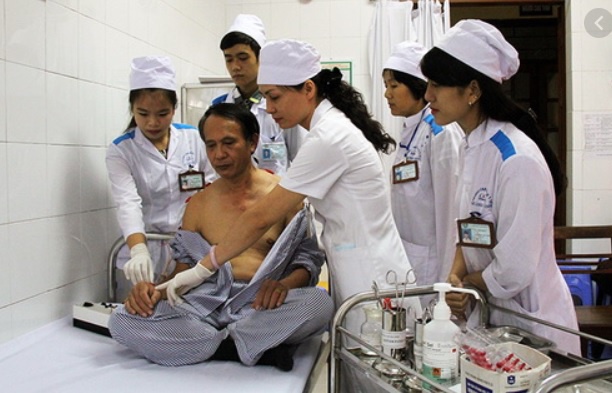 Society
Society

Tuition fees at some major universities in HCM City such as the University of Medicine Phạm Ngọc Thạch will increase sharply for the next school year, causing many parents and students to worry.

|
| Medical students are in the acupuncture practical period. — Photo zingnews.vn |
HÀ NỘI — Tuition fees at some major universities in HCM City such as the University of Medicine Phạm Ngọc Thạch will increase sharply for the next school year, causing many parents and students to worry.
Associate professor Bùi Hoài Thắng, head of the Training Faculty of the Science and Technology University – HCM City National University, said school fees for the next school year would be VNĐ25 million per year (US$995), up from about VNĐ12 million ($518) in previous years.
High-quality programmes with a more English language curriculum will cost VNĐ66 million ($2,850) per year, an increase of 10 per cent compared with the past.
Thắng said the increase was based on a decision of the HCM City National University for its financial self-control programme.
Similarly, next school year the University of Medicine Phạm Ngọc Thạch will have tuition fees of VNĐ32-28 million ($1,380-1,210) per year depending on the faculty, whereas the old fees were VNĐ14-28 million ($600-1,210) per year.
Nguyễn Minh Trí, a student of the Chemical Engineering Faculty at the University of Science and Technology, said the tuition fee increase would be an obstacle for students and would put pressure on their families.
"For me, that increase is high. My family members and I face a big difficulty,” he said.
Thu Hạng, another student of the faculty, said increased tuition fees must go hand in hand with increased training quality.
Professor Nguyễn Đình Đức, head of the Training Committee of the Hà Nội National University, said university autonomy, which allows schools to set their own fees, must ensure the rights of the poor and the disabled to have the opportunity to access higher education, including advanced and high-quality programmes.
The goal of higher education was to create high-quality human resources for society and if tuition fees became a burden on students, higher education would fail in this goal, he said.
"The State and universities need to have scholarship policies to support poor and disabled students. Loans from social banks with preferential policies for poor students are a viable and effective solution to support them when the school is autonomous," he said.
Need to increase
Associate Professor Ngô Minh Xuân, council chairman of the University of Medicine Phạm Ngọc Thạch, said that next school year, the university would double tuition fees, but this fee was still too cheap compared with other medical schools and compared to the training costs spent by the university.
Despite increasing tuition fees, this level still cannot "calculate correctly and fully" the training costs the university paid for students, Xuân said.
"How can any university in the world train medical students with VNĐ3 million ($129)? The school is only increasing tuition fees to survive. In fact, the cost of training medical students must be four or five times higher than that of other professions and occupations. If the tuition fees of other majors are about VNĐ50 million ($2,100) per year, then the medical profession must be at least VNĐ200 million ($8,600)," said Xuân.
He added that with the current training, the university was suffering from losses, and must take income from its clinic – the Phạm Ngọc Thạch Medicine University Clinic – to compensate.
When entering university autonomy and no longer receiving State funding, all public universities must have a roadmap to increase tuition fees to ensure the quality of training, not only medical and pharmaceutical training schools, he said. — VNS




